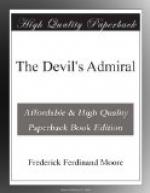I revelled in the noise and crowds as only one can after a week at sea. While I was on the way from Saigon the Russian armies might have been beaten or the Japanese fleet destroyed. There might be orders sending me anywhere, but I hoped that I would leave Manila for the Strait of Malacca to meet the Baltic fleet. What I feared most was the end of the war, for a war-correspondent without a war is deprived of his profession. I was young and ambitious, then, and seeking a journalistic reputation at the cable’s mouth.
It happened that I had allowed myself to heed the glib tongue of a hotel-runner before I left the rice-steamer, and he had commandeered my bag and taken it to the Oriente Hotel, of which I knew nothing except that it was in the walled city and across the river from the cable office. To recapture the bag and my clean linen I would have to take an instrument of torture known as a carromatta and drive across the Bridge of Spain.
I could cross the river in a small boat with a Filipino pirate, and go on a hunt for a conveyance on the other side; but thought it better to risk being shaken to death than drowned in the dirty Pasig, so I hailed a cochero. The villain demanded a double rate, and, while we were haggling, a bus of the Oriente drew in sight and I caught it as it was spinning up Calle San Fernando.
When I crawled into the bus I wished that I had struck a bargain with the thief of a cochero, for I found myself in a seat beside the whining missionary. He prayed for his bones over the rough places, and for his life, when the driver took a corner recklessly, and made us all very weary with his eternal complaining. That was not the worst of it—he tried to strike up an acquaintance with me.
There was a letter in my coat-pocket which had been given to me in Saigon to deliver to the Russian consul in Manila. It was an errand for the cable-operator there, who had done me favours, and I was to leave it at the Hong-Kong-Shanghai Bank for the consul, who would call for it. That bank carried an expense account for me, so the delivery of the letter was of no trouble. The envelope was long and official-looking, and it fell to the floor of the bus as I clambered in.
Meeker picked it up and handed it to me, but for the instant he held it he read the address:
Russian Consul,
Care Hong-Kong-Shanghai Bank,
Manila
Courtesy Mr. James A. Trenholm,
Amalgamated Press
“My dear sir,” said Meeker, “you have dropped a document—allow me.”
“Thank you,” I replied, and took the letter, which was quite bulky and sealed with a splotch of black wax imprinted with a coat of arms or a crest, or some such insignia. I fear I betrayed my irritation over Meeker’s reading the address.
“No offence, I trust, my dear sir,” he said, mild surprise in his tone.
“None whatever,” I snapped back; but our companions in the bus smiled and winked at me openly, as if they appreciated my cold manner toward the missionary.




